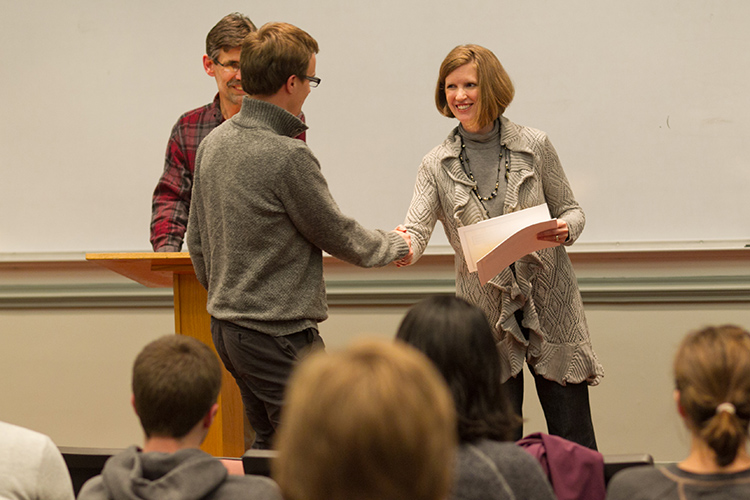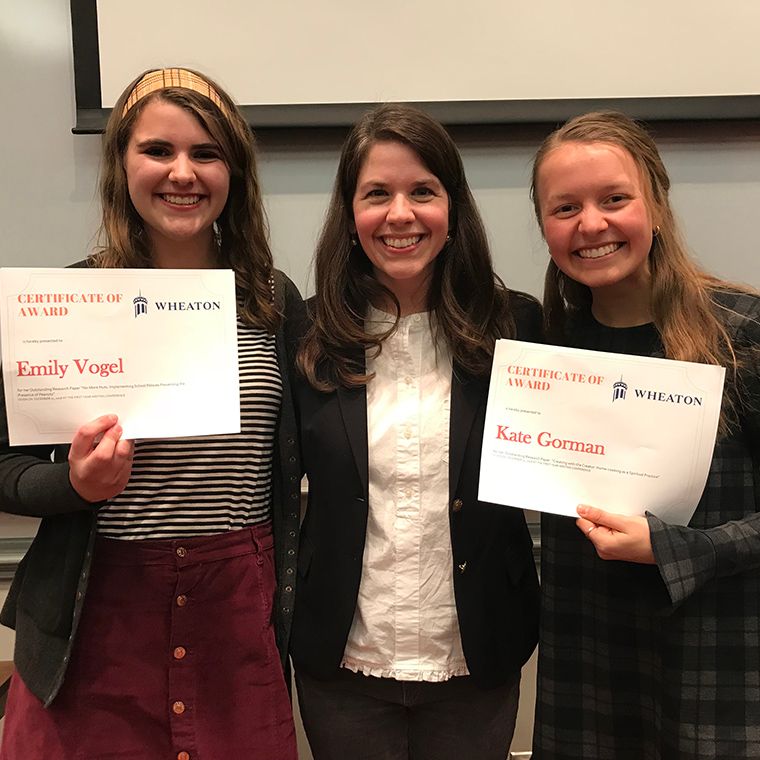Students are required to take First-Year Writing to fulfill the WRIT requirement for Christ at the Core. Wheaton offers two First-Year Writing course options:
Option 1: ENGW103: First Year Writing (one semester, 4 hours)
Option 2: ENGW105: First-Year Writing (fall linear quad, 2 hours) +
ENGW106: First-Year Writing (spring linear quad, 2 hours)
What's the difference between ENGW103 and ENGW105 + ENGW106?
ENGW103 is a semester-long First-Year Writing course. ENGW105 + ENGW106 is a "stretch" model of First-Year Writing: together, ENGW105 + ENGW106 have the same content and learning outcomes as ENGW103, but the content is "stretched" out over a full academic year. Students take ENGW105 (2 hours) in the fall semester as a linear quad (meeting once per week) and ENGW106 in the spring semester (2 hours) as a linear quad (meeting once per week).
Which course is best for me?
Students can choose to enroll in either ENGW103 or ENGW105 + ENGW106. Students who enroll in ENGW105 + ENGW106 will work with the same professor and cohort of students over the entire academic year. The "stretch" model is well-suited to students who want more time to complete assigned readings and writing assignments, as well as for students who would benefit from year-long mentorship and community.
Students should complete this Directed Self-Placement survey to determine which course is the best fit for their learning needs.
What is Directed Self-Placement?
Directed Self-Placement is a survey designed to help you select the best First-Year Writing course for your learning needs. The survey is not an exam or test; it is a low-stakes questionnaire that will help you make an informed decision about your enrollment.
- Step One: Complete the Directed Self-Placement survey here. It takes about 10-15 minutes.
- Step Two: Review your answers.
- Step Three: Review the First-Year Writing course descriptions.
- Step Four: Enroll in the First-Year Writing course that is best for you!
First-Year Writing Course Descriptions
ENGW103: First-Year Writing (4 hours)
This one-semester course equips students to grow as writers in the Wheaton College classroom and beyond. The course is designed to prepare students to write effectively in a variety of social contexts and to improve student learning and performance in many other facets of their undergraduate education.
ENGW105: First-Year Writing (2 hours)
This course meets as a linear quad (once per week) in the fall semester. Students must complete ENGW105 (fall semester) and ENGW106 (spring semester) in order to fulfill the WRIT requirement for Christ at the Core. Together, ENGW105 and ENGW106 cover the same course content and learning outcomes as ENGW103. Students should take ENGW105 and ENGW106 in successive semesters unless permission is granted by the English department chair. ENGW105 is a prerequisite for ENGW106. Recommended for first-year students.
ENGW106: First-Year Writing (2 hours)
This course meets as a linear quad (once per week) in the spring semester. Students must complete ENGW105 (fall semester) and ENGW106 (spring semester) in order to fulfill the WRIT requirement for Christ at the Core. Together, ENGW105 and ENGW106 cover the same course content and learning outcomes as ENGW103. Students should take ENGW105 and ENGW106 in successive semesters unless permission is granted by the English department chair. ENGW105 is a prerequisite for ENGW106. Recommended for first-year students.


